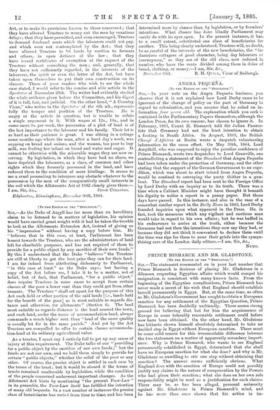[To THE EDITOR OF THE " SPECTATOR."' Slit, — As the Duke
of Argyll has far more than an hereditary claim to be listened to in matters of legislation, his opinion would have carried great weight with it had he taken the trouble to look at the Allotments Extension Act, instead of giving us his " impression " without having a copy before him. He "believes that in this case, at least, Parliament has been honest towards the Trustees, who are the administrators of land left for charitable purposes, and has not required of them to provide for a public object by any sacrifice of their own funds." By this I understand that the Duke " believes " the Trustees are still at liberty to get the best price they can for their land. I am far indeed from attributing dishonesty to Parliament, " in this case at least," as the Duke says ; but having a copy of the Act before me, I take it to be a matter, not of belief, but of fact, that Parliament, "for a public object," does require Trustees in some cases to accept from certain classes of the poor a lower rent than they could get from other tenants. The Trustees " shall set apart for the purpose of this Act such field or other portion of the said lands [i.e., lands held for the benefit of the poor] as is most suitable as regards distance and otherwise, for allotments" (Section 4). The land most suitable as regards distance is the land nearest the town, and such land, under the name of accommodation-land, always commands a much higher rent than "land of the same quality is usually let for in the same parish." And yet by the Act Trustees are compelled to offer to certain classes accommodation-land at its ordinary agricultural value.
As a trustee, I must say I entirely fail to get up any sense of injury at this requirement. The Duke talks of our " providing for a public object by the sacrifice of our own funds ;" but the funds are not our own, and we hold them simply to provide for certain " public objects," whether the relief of the poor or any other. Of course, the precise object is settled in each case by the terms of the trust ; but it would be absurd if the terms of trusts remained unalterable by legislation, while the condition of the people concerned underwent important changes. As the Allotment Act hints by mentioning "the present Poor-Law" in its preamble, the Poor-Law itself has fulfilled the intention of many old bequests. In a vast number of instances the precise class of beneficiaries has varied from time to time, and has been determined more by chance than by legislation, or by founders intentions. What chance has done blindly Parliament may surely do with its eyes open. In the present instance, it has, to a small extent, substituted one class of beneficiaries for another. This being clearly understood, Trustees will, no doubt, be as careful of the interests of the new beneficiaries, the "industrious cottagers of good character, being day labourers or journeymen," as they are of the old class, now reduced in number, who have the rents divided among them in doles of bread, clothing, or money.—I am, Sir, &c.,
December 30th. R. H. QUICK, Vicar of Sedbergh.










































 Previous page
Previous page